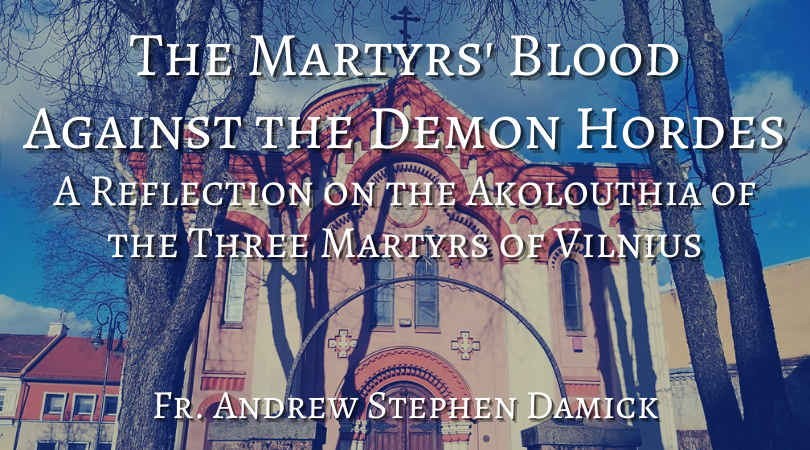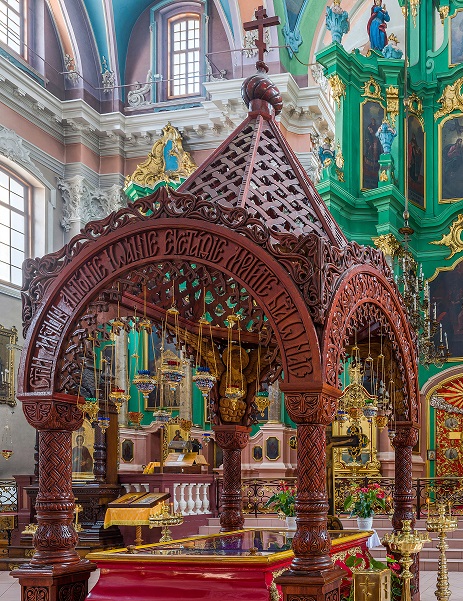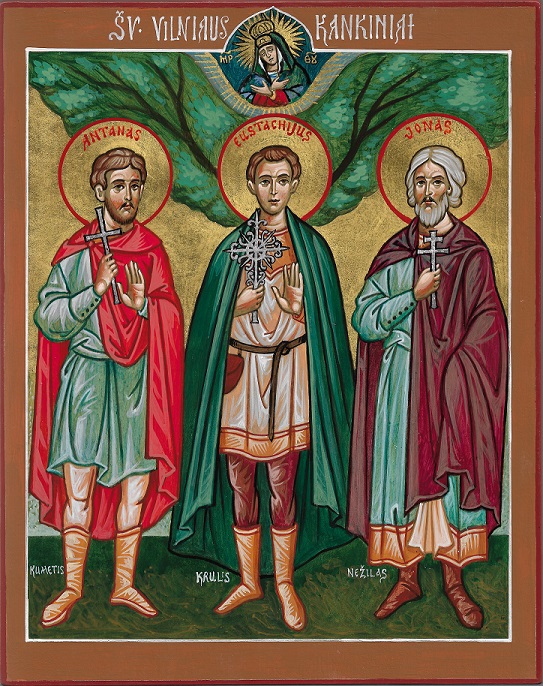
The Scriptures and all the liturgical services of the Orthodox Church include the theme of spiritual warfare, but it is particularly prominent in the liturgical services for the martyred saints. For example, the apolytikion used generally for martyrs says that the martyrs “cast down the tyrants and wholly destroyed the demons’ strengthless presumption.”
Why is this so? It is because the death of a martyr results from the combat between evil spiritual powers and the martyr himself, a confrontation in much of Christian history between paganism and the gospel of Jesus Christ. In every case, the fallen angels (demons) who animate paganism to kill the martyr think that they thereby defeat him and, by implication, the martyr’s God. It is a futile act on the demons’ part, however, because they are simply repeating what they did with Christ Himself, thinking that killing Him defeats Him, but it is they who are defeated by Christ’s entrance into death (1 Cor. 2:6-10).
In the akolouthia (festal texts) for the Three Martyrs of Vilnius (+1347) – Ss. Antanas, Eustachijus and Jonas, celebrated April 14 – we see the same celebration of the victory of martyrs over demons. Further, we see that the martyrs’ blood not only defeats the demons but elevates the martyrs to reigning alongside Christ. And the martyrdom also becomes the basis for the growth of the Christian Church and the illumination of the world. Thus, in one action, we see the kingdom of the demons being destroyed and the kingdom of Christ established and spread:
Hordes of evil demons were vanquished by the great quantity of the martyrs’ blood, O Bestower of life, and Thy Church hath been fortified thereby, hymning the glory of Thy power. (From Ode VI of the Canon)
Inverting Death, Turning Defeat to Victory
The historical particulars in the case of Ss. Antanas, Eustachijus and Jonas, is that they were killed by Algirdas, Grand Duke of Lithuania, who demanded that they eat meat during the time of the Great Fast before Pascha. As we know from the hagiography of the martyrs, Algirdas had formerly left paganism, been baptized and married to the Orthodox Christian princess Maria Yaroslavna of Vitebsk, who brought her priest Nestor with her. Nestor baptized the three martyrs himself and other members of the royal Lithuanian court. But when Maria died, Algirdas forsook Christ and returned to his pagan ways.
So the demand that the martyrs eat meat was not about merely breaking a fasting rule but rather about following Algirdas into his reversion from Christianity back to paganism, to worship Perkūnas with him, the Baltic god of fire and lightning. It seems likely that the meat he gave them to eat would have been sacrificed to Perkūnas, and so eating it would have put them into communion with that god – from the Christian point of view, eating pagan sacrifice is communion with a demon (1 Cor. 10:20).
Thus, we see that Perkūnas (that is, the demon who used this name) was working through Algirdas by means of pagan sacrifice, confronting and trying to destroy the martyrs and kill off nascent Christianity in Lithuania. This confrontation with the worship of Perkūnas is illustrated in these hymns:
Ye did not render worship to material fire, O divinely eloquent ones, and have been delivered from the fire of Gehenna; and, though subjected to fire and torture, O saints, ye did not deny the Master of all, but, rejoicing, strove to preserve the Faith until death.
Tested in the fire of torture like gold in a crucible, ye were radiantly tried, O ever-memorable martyrs, and have been shown to be more precious than gold in your nature; for, showing forth the all-radiant beauty of your souls, ye truly offered yourselves to the Master as most precious vessels, not having worshiped fire. Wherefore, pray to the Lord for us all, that He grant remission of sins unto those who honor your memory with love. (From the Sessional Hymns)
Refusing to worship fire, and being subjected to fire and torments, O ever memorable ones, ye received heavenly dew, divine rest and everlasting joy; and having utterly consumed the princes of darkness by your endurance of pain, O all-wise martyrs, ye have made the faithful steadfast in true piety. (From the Praises)
In all three of these hymns, we see how the martyrs refuse to worship fire (which refers to the worship of Perkūnas), and the hymnographer has inverted the image, showing how the martyrs pass through fire, are delivered from the fire of damnation (Gehenna), and are brought to refinement and to rest by Christ. We see how the demon thinks that he can defeat the martyrs with death but instead is defeated by them and has to watch them elevated to rest and joy.
The same inversion is seen in other hymns:
When thy shins and bones were broken, thy thighs unnaturally shattered, and thy nose and ears severed, thou didst rejoice, O ever-memorable and most blessed Eustachijus, cutting off the serpent’s head of idolatry. Wherefore, Christ God, the Judge of the contest, hath given thee the crown of victory. (From the Vespers Stichera)
In this hymn, we see how St. Eustachijus is subjected to having his bodily members broken and cut off, yet in the end it is “the serpent’s head of idolatry” which is actually cut off, and the martyr is crowned in victory. Likewise, Algirdas tries to shame the martyrs by attempting to force them to be humiliated before his false god, yet it is Algirdas and his false god who are shamed, while the martyrs are crowned:
O blessed martyrs of great renown, ye wisely put to shame the iniquitous king who unlawfully commanded you to worship and render honor to inanimate and soulless gods, and, having suffered patiently and lawfully, ye fashioned crowns of victory, praying for the world. (From the Aposticha of Vespers)
Standing with the Angels, Uniting Heaven and Earth
There are more references to this inversion throughout the akolouthia, but we will move on to another theme, the elevation of the martyrs to reign alongside Christ. In one of the apolytikia for the feast, we sing:
O valiant and honored athletes who spurned earthly honors and glory, mightily and manfully did ye endure torments for the sake of the Faith, giving yourselves over to death for the Master, the Life of all. Wherefore, with a pillar of cloud from heaven did Christ all-gloriously illumine you. Standing before Him with the angels, pray ye that our souls be saved.
Another apolytikion has similar language, saying that they “received crowns of victory” and are “standing with the angels before the throne of the Master.” Standing before Christ alongside the angels, the three martyrs are now shown to be part of the divine council, the heavenly hosts who serve the Holy Trinity forever. And they shine with His glory, interceding for us:
Standing with the heavenly hosts before Him Who hath dominion over all, O valiant martyrs, deliver from perils and everlasting torment those who honor you. (From Ode VI of the Canon)
Because they are now part of the heavenly hosts, they function like the angels, protecting the faithful and bringing them to salvation. And their resurrected souls, now numbered alongside the angels, nonetheless remain connected to earth through their incorrupt bodies:

The earth containeth your precious bodies, O God-bearers, but heaven holdeth your souls; wherefore, rejoice with the angels, O martyrs, chanting to the Lord the thrice-holy hymn: Bless the Lord, all ye works of the Lord! (From Ode VIII of the Canon)
The relics of the martyrs that are venerated in the Monastery of the Holy Spirit in Vilnius thus connect us to them as they sing the thrice-holy hymn–they in heaven and we on earth. The Church in both places at once is united by their holy relics, and earth is made into heaven by their presence.
Establishing the Church, Illumining the World
As we stand alongside the martyrs and celebrate their feasts, we find that their martyrdom establishes the Church and brings to it nourishment and growth. As the protomartyrs of Lithuania, Ss. Antanas, Eustachijus and Jonas bring forth the Christian faith out of barrenness:
Having caused branches of the Orthodox Faith to spring forth from a barren root, O all-blessed ones, ye were shown to be namesakes of the protomartyr; for ye were not daunted by the wrath of the evil and impious prince, who commanded you to renounce Christ. Wherefore, having received crowns of victory, and standing with the angels before the throne of the Master, O all-blessed ones, pray for us who in Orthodox manner honor your holy memory. (Second Apolytikion for the feast)
Here, they are compared to St. Stephen the Archdeacon and Protomartyr (celebrated Dec. 27), and just as his death led to the growth of the Church in first-century Palestine, so did the death of the Three Martyrs bring about the growth of the Church in Lithuania. They “caused branches of the Orthodox Faith to spring forth from a barren root.” The “barren root” is a society ruled by demons through paganism, but the root can be made fruitful by being watered by the blood of the martyrs and planted not in pagan sacrifice but in the worship of Christ.
Their martyrdom brings forth the light of the knowledge of Christ:
With sacred hymns we praise you, O wise and godly athletes Antanas, Jonas and Eustachijus, ye proponents of the Faith, champions of piety, greatly radiant stars of the Church who by grace caused the darkness of falsehood to fade and shone forth the light of true knowledge of God.
Giving yourselves over to wounds and torments, O holy ones, ye remained unshakable in your wisdom, and like lamps lighted by the fervor of the Spirit, ye illumine the hearts of the faithful with grace and dispel every ailment and every affliction. Wherefore, every race and generation doth celebrate your holy memory, glorifying the Lord with hymns.
With the radiance of your wonders, O martyrs, ye have illumined all creation, driving the gloom of sufferings and tribulations, the enmity of the demons and illnesses away from those who have recourse to you with tears and with faith entreat your aid, O valiant athletes of the Savior, Antanas, Jonas and Eustachijus. Wherefore, with faith we celebrate your holy and luminous solemnity. (From the Stichera of Vespers)
Again, we could quote many more hymns, but these should suffice to illustrate the point. But how does martyrdom illumine the world?
O divine martyrs, ye were heavens declaring the mysteries of God and proclaiming His glory to all; for report of your struggles and faith hath gone forth unto all the ends of the Orthodox Church. Wherefore, the whole Church honoreth the sufferings which ye valiantly endured for Christ, O ever glorious ones. (From the Stichera of Vespers)
 When the martyrs were killed, the news of their courage in the face of torture and death went out and became so well-known that even the great St. Sergius of Radonezh desired to have relics from their bodies for his veneration. Their martyrdom declared “the mysteries of God” and His glory. What, then, are those mysteries, that glory?
When the martyrs were killed, the news of their courage in the face of torture and death went out and became so well-known that even the great St. Sergius of Radonezh desired to have relics from their bodies for his veneration. Their martyrdom declared “the mysteries of God” and His glory. What, then, are those mysteries, that glory?
This news of martyrdom shows to the world that not even death can defeat those who are obedient to the gospel of Jesus Christ, just as it could not defeat Christ Himself. Indeed, the gospel is precisely the message that demons, sin, and death have been defeated by Christ.
As Orthodox Christians, those who love the martyrs and declare their works in sacred hymns, this is the mystery that we proclaim, that the hour of glory for Christ is precisely His Cross. Thus, when we participate in Christ’s sufferings as the martyrs did, through repentance, prayer, ascetic struggle, and through participation in the feasts of the martyrs, then we also become bright lamps illumining the world as sons of the light (John 12:23-26).



